[ad_1]
Certain recipes aren’t complete without sesame seeds when you’re cooking, are they? That’s just what happened to me.
Some of you might already know besides us humans, there is another species a whole lot smaller than us but will surely adore seeds just as much.
Bingo, if you guessed birds!
After much contemplation, I began researching the safety and benefits (if any) of sesame seeds for bird consumption to put the surplus stash of sesame seeds into good use.
I found that my birds CAN eat sesame seeds in moderation. Let’s discuss things in detail, shall we?
Are Sesame Seeds Safe for Birds?
In the wild, birds of each species adapt to diets that are actively available in their habitat. It becomes quite a hurdle to scour which food will provide essential nutrients while being safe and non-toxic.
Taking all of the properties of sesame seeds, they have the highest fat content compared to the other edible seeds.
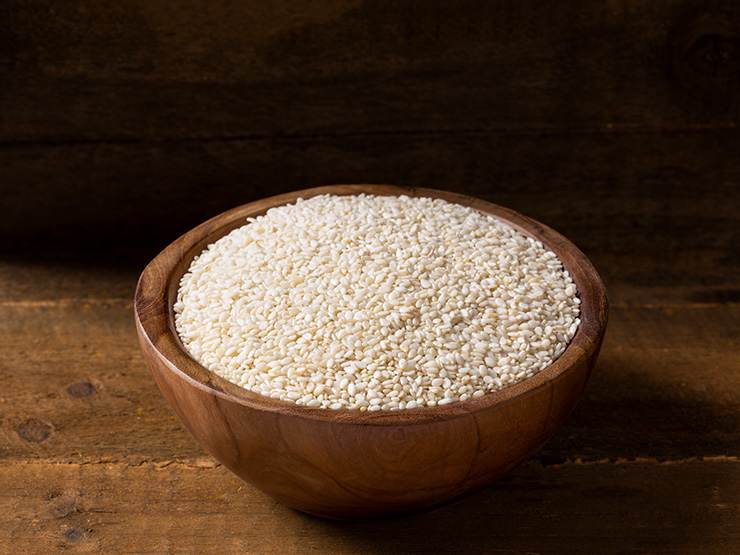
Does that deem sesame seeds unsafe for birds? No, it just means that adding sesame seeds to your bird’s diet should be in moderation.
Birds are prone to obesity which can lead to cardiovascular diseases; hence, the concern for consuming sesame seeds in moderation remains.
Besides this minor obstacle, the benefits of sesame seeds far outweigh the repercussions of the high-fat content.
Another thing to look out for when adding sesame seeds to your bird’s diet is to see if they’re allergic. Sesame allergies are notorious, as immune systems can overreact to the proteins found in them.
Don’t forget to check in with your vet before adding sesame seeds to your bird’s diet.
What Are the Benefits of Sesame Seeds?
Have you ever wondered why sesame seeds are beloved in Asian cuisine this much? It’s because these tiny little seeds packet an immense number of benefits.
Whether tahini or sesame brittle, sesame seeds seeped their way into cuisines worldwide.
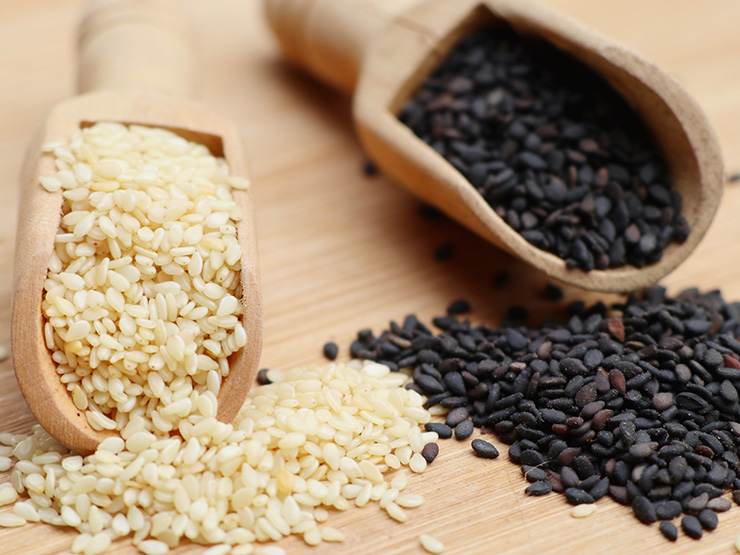
Let’s explore all the benefits that made sesame seeds loved worldwide.
1. High Fiber Content
Of all the organisms in the animal kingdom, birds are notorious as the species with the weakest digestive system.
That’s where sesame seeds come to the rescue!
Fiber provides roughage to ‘keep things moving’ and prevent gastrointestinal diseases.
Only 10g of unhulled sesame seeds can provide up to 1.3 grams of fiber. That’s almost the average daily required intake of birds.
2. Reduces High Cholesterol Levels
It might be shocking, but sesame seeds contain 15% saturated fat, 41% polyunsaturated fat, and 39% monounsaturated fat.
How can a seed with high-fat content reduce cholesterol, you may ask?
In comparison to the three types of fat, sesame seeds consist of saturated fat the least.
Saturated fat is responsible for increasing LDL cholesterol that causes cardiovascular diseases).
Research has proven monounsaturated and polyunsaturated fats increase HDL cholesterol (the healthy cholesterol). Sesame seeds also contain two types of plant compounds – lignans and phytosterols.
Taking this information into account, the fat content in sesame seeds may not be all bad. Of course, moderate consumption is always advisable.
3. Beneficial Source of Plant Protein
Protein is a crucial building block responsible for muscle growth and DNA formation.
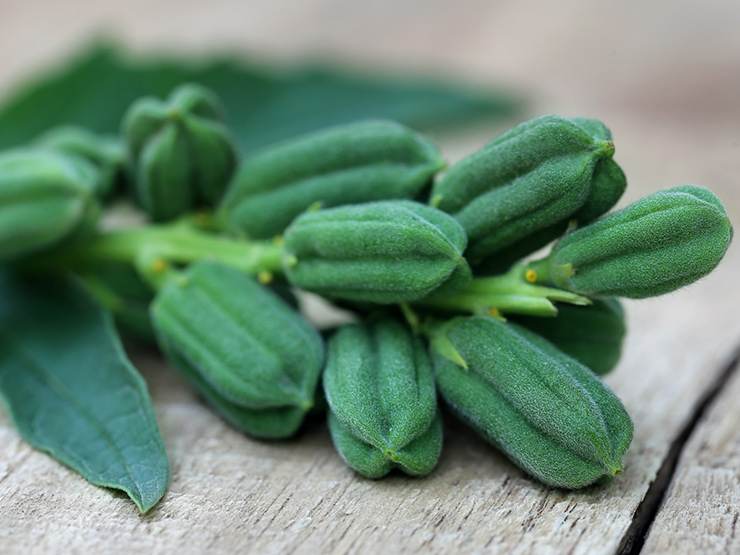
Birds are prone to musculoskeletal diseases such as Angel Wings disease without protein. Hence, birds require a protein-centered diet to grow healthy muscle for efficient flying, which aids in their ability to scavenge food.
With each tablespoon of sesame seeds, you can increase your bird’s protein intake by 0.6g.
The best part is that sesame seeds have high concentrations of methionine and cysteine, two essential amino acids your bird won’t have access to from their regular diet.
4. Alternative Source for Calcium
Cannot increase your bird’s calcium intake because of lactose intolerance? Why worry when sesame seeds are there to provide 87.8mg of calcium in each tablespoon of serving?
Calcium is the nutrient birds require most but faces a deficiency. Due to birds being lactose intolerant, dairy consumption is not advisable, which makes sesame seeds the perfect substitute.
Calcium is a necessary micromineral required for maintaining bone health. A deficiency of calcium can lead to osteoporosis, wing paralyzation, and other musculoskeletal diseases.
5. Prevents Skin Diseases
Birds are more prone to skin infections during the preening season than we think. Hence, it’s important to keep up with their Vitamin E and manganese intake.
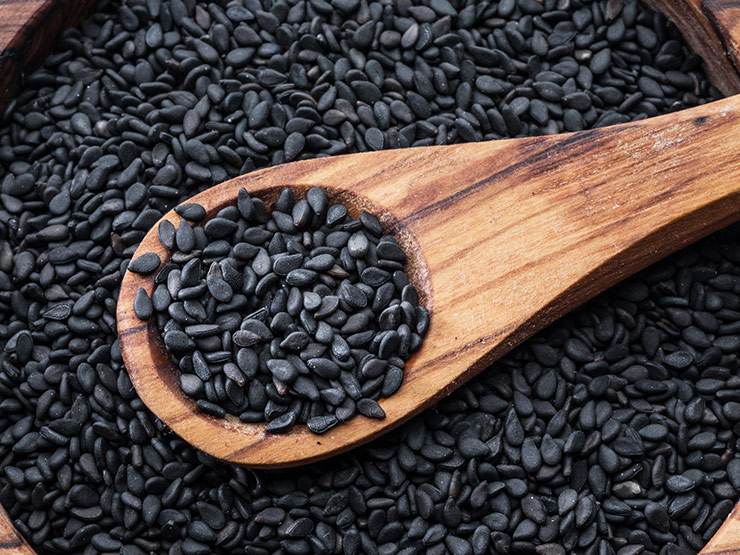
Vitamin E is an essential antioxidant that increases skin cell turnover and prevents skin inflammation in birds. Manganese is a micromineral responsible for cell growth and curing feather cysts in birds.
If your bird struggles with skin infections, sesame seeds will come to its rescue because of the high concentration of manganese and vitamin E.
6. Good Source of B Vitamins
B Vitamins are micromineral that even we humans have to consume externally. Imagine how much birds can struggle to keep up their B vitamin intakes, then?
The good news for them is sesame seeds contain three vital B vitamins. Containing vitamins B1, B6, and B3, sesame seeds are known as the seed with the highest concentration of a wide range of B vitamins.
B vitamins are crucial for digestion, eyesight, brain function, and appetite maintenance. If your bird struggles with mood disorders, don’t forget to check for vitamin B deficiencies.
With all the impeccable benefits listed above, it’s obvious why the benefits far outweigh the downsides of adding sesame seeds to your bird’s diet.
How Should You Feed Them Sesame Seeds? Hulled or Unhulled?
Let’s put a lifelong debate in the bird community. I half-expect to receive a thousand questions about this, so why not dedicate an entire section to it?
It all depends on which nutrition your bird requires the most.
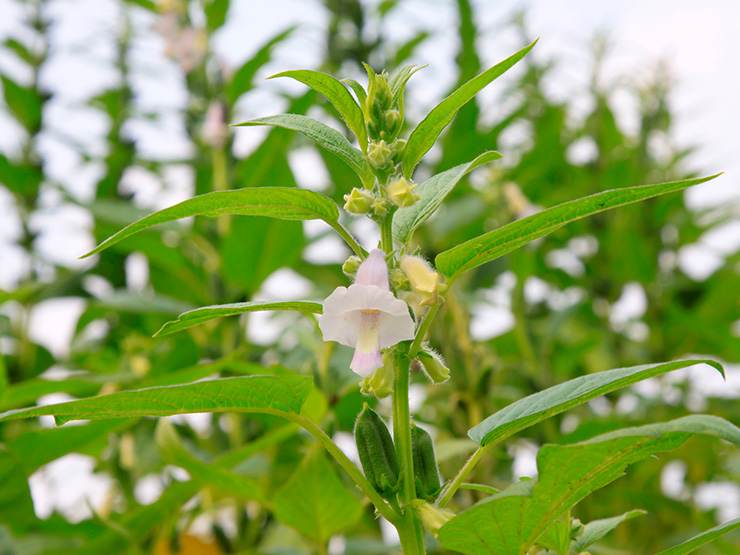
If your bird is struggling with digestive disorders, hulled sesame seeds are the way to go, as the added hulls provide extra fiber to their diet.
Similarly, if you want to take your bird’s calcium intake one step higher, hulled sesame seeds are best, as they contain the most calcium.
However, hulled sesame seeds reduce oxalates and phytates – these are compounds that reduce your bird’s ability to absorb protein.
A mix of unhulled and hulled sesame seeds lets your bird enjoy the best of both worlds in terms of benefits.
Frequently Asked Questions
Let’s answer some of your popular questions regarding birds and sesame seeds. I hope, you’ll be able to clear out some of your long-standing doubts with this section of the article.
Can Birds Eat Raw Sesame Seeds?
Raw sesame seeds are my bird’s favorite. Why won’t it be? It holds the highest concentration of microminerals. Polyunsaturated fats such as Omega 3 and 6 are in raw sesame seeds mostly.
The main question is whether to choose the unhulled or hulled option when it comes to choosing raw sesame seeds. To know more about this, don’t forget to check out an entire section dedicated to it above.
Can Birds Eat Toasted Sesame Seeds?
Toasting sesame seeds enhances the nutty flavor. However, it reduces your bird’s ability to absorb all the healthy protein.
One thing to look out for when adding toasted sesame seeds to the mix is not to opt for the store-bought ones, as they contain added salt which will instantly give your bird salt toxicosis.
Can Birds Eat Roasted Sesame Seeds?
Roasted sesame seeds are sold for human consumption, meaning they contain salt. We all know how we feel about added salt in our feathered friend’s diets, right?
When opting for roasted sesame seeds, the best option is to roast them at home.
Can Birds Eat White Sesame Seeds?
Birds can consume white seeds; however, the fat content in white sesame seeds is more than in black sesame seeds.
If your bird prefers mellow flavors, white sesame seeds are best. Like always, consumption in moderation is advisable.
Can Birds Eat Black Sesame Seeds?
Black sesame seeds are slightly stronger in flavor, which my birds love with all their heart. However, this may not be the case for all birds. Trial and error might be your best friend in this case.
Besides flavor, research has found that black sesame seeds have higher antioxidant activity than white sesame seeds. Hence, black sesame seeds are hands down the winner in my books.
Can Baby Birds Eat Sesame Seeds?
The protein and calcium present in sesame seeds make them a beneficial addition to a baby bird’s diet.
However, there is a choking risk associated with unhulled sesame seeds. If you intend to add sesame seeds to your baby bird’s diet, your best option is to add the hulled ones. Unfortunately, that will reduce the fiber and calcium content in them.
Can Garden Birds Eat Sesame Seeds?
Garden birds are frequent visitors to every bird enthusiast’s home. Hence, it’s essential to look out for their needs.
Adding sesame seeds to your birdfeeder will be highly nutritious for garden birds, especially during mating season, as it will reduce the egg-binding in the females.
Planting sesame in your garden will allow them to enjoy a different flavor of sesame seeds.
Can Pet Birds Eat Sesame Seeds?
Pet birds are often malnourished due to consuming mass-produced seed mix. Unable to provide beneficial nutrition, mass-produced seed mix does more harm than good.
Hence, creating your own seed mix will allow you to incorporate and personalize your bird’s diet to suit its nutrition needs while remaining just as tasty.
Can Wild Birds Eat Sesame Seeds?
Believe it or not, wild birds scavenge for sesame seeds and plants when it’s in season.
Coincidentally, sesame is available in the wild just in time for bird’s mating season. The manganese in sesame seeds prevents egg-binding.
Hence, don’t forget to add sesame in your gardens and bird feeder during mating season!
Final Remarks
Having everything jotted down, it’s obvious what an exceptional addition of sesame seeds will be to your bird’s diet. The benefits are to die for.
Of course, safety comes first. Checking in with your vet is the first course of action.
[ad_2]
Source by [author_name]



